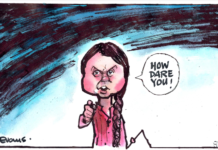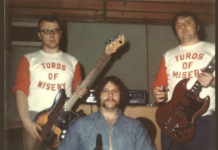The National government’s misnamed health reforms of the 1990s were based on the simplistic experimental premise that the health system would function much better if it were required to function in a ‘free’ competitive market.
This new system (1993-99) included public hospitals not only competing against private hospitals but also against each other. It proved to be idiotic and impractical while the pretence was maintained by that government that health was a universal public good rather than a commercial commodity.
Unsurprisingly this flawed experiment did not survive into the next decade. In a historical context this experiment should be seen as an interruption in the development of Aotearoa New Zealand’s health system.
Lies delivered by soundbites
In the lead up to this experiment’s implementation there was a much repeated claim that featured in the promotional propaganda. A feature of this propaganda was the recently rebuilt North Shore Hospital which it claimed was virtually empty of patients. This claim proved to be a lie.
This rebuild was planned to meet estimated population growth (the hospital served one of the fastest growing populations in the country). Further, the rebuild was also to allow local patients who were previously to go to Auckland Hospital on the other side of the harbour required to be treated locally.
In other words, it was good planning. Within a short period of time the new facility was fully operational and subsequently further rebuilding was required to again increase capacity. But the soundbite delivered lie was appealing for a short time at least.

Lies replace truth
Since 2021 the Labour government has taken its cue from National three decades earlier with its own lie masquerading as a fact. It claimed its decision to abolish district health boards (DHBs) was because they were responsible for postcode lottery (ie, access to health services was determined by where people happened to live).
This second lie is dealt by me in greater depth in an article published by BusinessDesk (16 March): Exposing the postcode lottery lie.
In summary, to the extent that there has been a postcode lottery it predated DHBs established in 2001. The innovative nature of DHBs was that they were statutorily responsible for the healthcare (both hospital and community compared with just the former) of geographically defined populations. Among other things DHBs were consequentially required to undertake needs analyses of their populations.
This requirement meant that DHBs became adept increasingly at understanding the accessibility of their populations to health services in both their communities and hospitals.
Increased proficiency in identifying what has become described as postcode lottery was an outcome. So this increasing of the transparency and awareness of postcode lottery became the basis of the lie that DHBs were its.
Oops
According to this second lie, creating the new centralised bureaucracy Health New Zealand – Te Whatu Ora (along with the Māori Health Authority – Te Aka Whai Ora) would be the solution to postcode lottery.
So imagine the horror the Labour government would have felt with a Stuff article (21 October) reporting that postcode lottery had got worse since HNZ’s establishment on 1 July: Postcode lottery worsened since abolition of DHBs.
The article quoted doctors saying that the only things that has changed so far were logos. What’s more, health statistics were getting worse. This deterioration included waitlists for planned surgery and difficulties of getting a general practitioner appointments. This is compounded by “crisis-point” health professional workforce shortages.
The article is revealing but not fully on the mark. To begin with HNZ has only been in existence for less than four months Furthermore, HNZ was poorly served by the Government’s Transition Unit led by business consultants.
Next to nothing (barely a template) had been developed to help the new centralised system function at a practical operational level. What HNZ was left with resembled the scaffolding for a building but without the building itself.
But, more importantly, when health restructuring is based on a lie, whether under National or Labour governments, there is an even greater absence of truth than the lie itself.

Annette King, a contrasting far-sighted health minister
This wider truth absence is that structural change only makes sense if it is designed to better enable a change in health system culture. An earlier far-sighted (by way of contrast) is provided in the 2000s by the Labour led government under Prime Minister Helen Clark and Minister of Health Annette King.
As well as changing the health system culture from competition to cooperation, they also wanted to change it in order to focus on integrating healthcare between communities and hospitals.
The structural change to better enable this was new entities charged with responsibility for geographically defined populations. The more this integration was done the more the pressure of acute demand on hospitals was controlled.
What really drives postcode lottery
The drivers of postcode lottery was not the structures (DHBs). In part, geography had a role. But much more important were external social determinants of health. These determinants such as poverty (especially), poor housing and limited educational opportunities are by far the biggest cause of inequitable healthcare access.
The more these social determinants are reduced the less the demand on the health system and the better and more equitable the access to it. But overwhelmingly reducing these determinants requires government actions through legislation and policies rather than actions by the health system itself.
When these determinants are compounded by our largely politically created severe health professional workforce shortages we have a perfect storm for increasing the postcode lottery. Just as DHBs were not the drivers of this, neither is their replacing structure (Health New Zealand).
The difference between before 1 July and now is that the removal of critical legislative requirements of DHBs in the new Pae Ora Act and their replacement by a new more centralised and distant structure makes addressing postcode lottery more difficult, not less.
Ian Powell was Executive Director of the Association of Salaried Medical Specialists, the professional union representing senior doctors and dentists in New Zealand, for over 30 years, until December 2019. He is now a health systems, labour market, and political commentator living in the small river estuary community of Otaihanga (the place by the tide). First published at Otaihanga Second Opinion





Headline story in yesterday’s Chch Press nurses fear to go to work due to abuse and lack of staff. Doctors overworked and underpaid. zThe study for 6 years come out with $120000 debt and starting salery $ 65000. Why stay here when over the sea they can get $120000 . In the same paper rest home bosses say they have had to close hundreds of beds in rest homes due to lack,of staff to supervise inmates .This means in some cases they take up room in hospitals .
When is Dr Do Little going to be honest call health a crisis and change immegration setting as advised by all the appropriate bodies.
I find it interesting that the 1st world sees the 3rd world as the source of cheap labour to provide the standard of living to which we feel entitled. Have we learnt nothing from importing labour without also providing infrastructure?
There is a global shortage of trained medical staff; remember John Key’s promise to raise NZ wages to those paid in Australia – seems executives got the parity but no one else. How about we start by settling the nurses ongoing pay dispute and aligning their wages with Australia.
This problem has been years in the making, I can remember it being warned about at least 15 years ago; ever since we ‘commercialized’ nurse training (along with teachers, and apprentices) this crisis has been looming. Entry to medical school has also been grossly over controlled and limited to only the financially able.
I want to see the government reintroduce paid training for nurses (and teaches) and a better selection and more financial support for doctor training (along with some bonding scheme); and stop relying on immigration. We also need to learn from our covid experience and start paying those that are important to the smooth functioning of society.
Our health system is getting worse as they allow more people to enter NZ and access the NZ health system, while creating conditions to support lower and lower wages in NZ, which drives more professional people needed like doctors and nurses out of NZ.
As someone pointed out, a pizza manager is now getting residency on the back of their ‘critical’ work skills when it has been clear for a long time that there is a highly organised people trafficking, government green lit, immigration scam in NZ that it driving the growing dysfunction of criminal activity and poverty in NZ.
NZ has zero transparency. In this case a large rest home hired a fraudster (clearly did not put into place conditions to stop him reoffending) and then gets name suppression. Not justice, just encouraging more large companies to have poor recruitment and prey on other people.
Land development firm goes to Supreme Court to suppress identity of rest home fraudster
https://www.nzherald.co.nz/nz/land-development-firm-goes-to-supreme-court-to-suppress-identity-of-rest-home-fraudster/HFNW4UIEFJ7I2QA7XBAPIKBHFA/
It’s got to the point, where everyone just helps themselves in NZ. You will get away with it – from filling up $1000 groceries for free, to stealing from a food bank, to stealing from a DHB while spending more time outside NZ than inside doing their jobs, https://www.stuff.co.nz/national/health/114004939/no-criminal-charges-for-former-waikato-dhb-boss-nigel-murray?rm=a
The funny thing is that now those allowing the crimes, now virtue signal how wonderful they are for forgiving and covering it all up.
What a wonderful recruitment drive, come and stay in NZ, criminals perpetual chances, but if you offend, NZ justice ‘helps’ you by covering it up so nobody reputation is damaged.
Not that pleasant for the victims, and making NZ a bad place to live and work if you are honest.
Again, thank you to Dr Power. It’s not that clear to me whether this government is deliberately lying, or is being lied to by its inept advisors, or both. Either way, it is bad new for the uninsured.
Spoken by one who champions right-wing governance that drives down the income levels of most, such that the cost of insurance is beyond them.
health insurance after age 65 when you need it most is affordable by most people now .
Richard + Christie Not sure what you’re getting at here.
Under the DHB model it was presumably difficult to send a patient across the border for a colonoscopy for example. Presumably the DHB’s would need very clear contracts for taking patients for a service that each DHB could undertake in their own region. Transfer of patients between DHB’s was common for ‘contracted’ healthcare such as cancer treatment. So in theory this new model should make it easier to send a patient across the border for a timely treatment. Just code the patient to their own region for stats purposes to see if their home region needs more capacity.
The new centralised funding model makes sense IMO because it is more cost effective to fly people and bus them around to services rather than run costly services where demand may be minimal. We have a health shuttle in a rural area to take patients 3 hours drive for operations/treatment. Accomodation is provided where necessary. Flights also easy to arrange where greater distances needed to travel.
Thats all pretty simple for people in living in rural areas as they are used to it.
The bigger picture problem/question. How good do we make the health system? Do we want to ensure every patient is treated fully and timely? What are the ramifications financially? How do we ration healthcare? By delaying care does this cost more in the long run? If the system is too good will people get rid of costly health insurance?
Just by denying access to medicines costs up to $10 in hospitalisation costs and $20 in social costs additional to every dollar not spent on meds. So yes by denying care it costs 1,000s more in additional health costs for every dollar. WHY SHOULD WE NEED HEALTH INSURANCE that crap came out of the USA. It is not that LONG AGO WE NEVER NEEDED HEALTH INSURANCE.
Well medicine funding has been an issue for a long time. Who did PHARMAC have to go to if they wanted their budget increased (although Sara Fitt seems almost allergic to the idea) …. the DHB’s. That was problematic in itself, and probably no different under the new model. Pharmac the “envy of the world”. Bollocks.
Thanks, Orbital Panda. Nice to hear actual practicalities brought up as to why having 20 separate mini empires doesn’t make sense in a country our size. I think there have been a number of non-political voices working in healthcare that have pointed out inconsistent delivery and that was not related to the socio-economic background of the patients.
I love the way 20 executive boards, and all that goes with that, is not seen as bureaucracy
No it was not that difficult to access treatment from another DHB if your one was not able to provide it. There was even a funding mechanism to support this called inter-district flows. Give-or-take, around 50% or more of Auckland DHB’s hospital funding came from patients referred from other DHBs for example.
savenz. The “critical worker “ visa category also seems to make some immigrants entitled and bossy. A nearby Indian immigrant in a rented house, describing himself as a senior Chorus executive, placed a note on the windscreen of a parked car, two weeks after he moved in. The note said that the car was unwarranted and unregistered, and to do something about it. One or other fact was incorrect, and the vehicle was not being driven, but being shepherded by permanent residents on behalf of absent elderly parents. An Indian chef neighbour condemned Chinese neighbours to me, as dirty people. The Chinese are good neighbours. The chef wheels costly supermarket trollies home and leaves them lying askew outside his door for weeks. A Chinese man plays the flute, and it is lovely to hear on a summer’s evening. The chef’s family raise their voices to each other and their child so loudly within their rental accommodation, that they can be heard by passersby. I am feeling culture shocked.
All the ways people can scam their way into NZ, does not make it a nice place anymore. The honest migrants are not getting in because the whole system is now skewed to scammers.
In the middle/end of a pandemic how wise is it to allow the largest mass migration ever achieved in NZ with no age or skill or language category, with half the people meeting the bizarre criteria dependants and most in jobs that are labour scams.
Now Labeen are getting back the aged parents category, when we have a crisis of aged care for existing Kiwis. In the past this was completely abused and within a short period the oldies are ‘abandoned’ by their migrant kids or the fake paperwork job doesn’t exist at the so called rate, so that more foreign pensioners can access NZ benefits like super and aged health care.
n addition most of the lefties championing this have an aged foreign pensioner on the side that they are championing getting NZ state money for and are remarkably successful at it. NZ is a shambles of unfairness and stupidity. Nothing wrong with aged relatives visiting if they are fit and well, but why are NZ taxpayers expected to support foreign pensioners when they seldom have funds or insurance in place so that the costs all fall on the NZ DHB’s taking up more beds and resources in NZ?
ALL those issues can be found in white and maori NZ familiies holly , self absorbed entitlement knows no racial boundries
Arseholes are arseholes – wherever they come from.
But you highlight a problem for working class. Bringing in migrants to compete for jobs and inadequate services drives racism, division, hostility. And the working class are not engaging in Socratic dialogue with university or professional colleagues in perfect English, while safely covered by medical insurance, and going home to leafy, spacious, comfort in warm, well-appointed homes.
Those of the working class lucky enough to have a home, are jam-packed in tumbledown houses cheek to jowl with their neighbours, struggling with multiple languages and manifold, little understood cultures within a cruel ‘hunger games’ that turns those neighbours into competitors for the means to live.
I heard from an insider that Health NZ is a shambles.
But they do have a new logo, so all is well
And a new name in Te Reo that means nothing to most and thus is not identifiable as “NZ Health”.
Which is good because it sounds like the level of service & care is not identifiable as NZ Health either.
oh ‘an insider’ so it must be true (w)anker
Great article. I always wonder if changing the deck chairs will change anything substantial. Time will tell.
Central control is good. Everything works so much better when run by govt. Vote Labour. For a better functioning NZ.
Now,now SK that’s a little sarcastic.
Nice to see everyone finally waking up.
After all I been saying this for longer than Ian has .
Our Health system has been almost Americanised.
it certainly works better than a pretend faux martket cabbage…the example our riggged electricity market.
You still get electricity, you will however find it hard to find a GP who still admits patients and you have a good chance of dying while waiting for emergency care in a hospital.
will you continue to get lekky though and at a less than extortionate price bratty?
and just so you know your strawman has failed I didn’t suggest the health system is ok, that’s the voices in your head again.
For background on factors in USA health systems, money and admin etc and the extensive rorts when privatised, I found this economics, business author Malcolm K. Sparrow. I think he is still at Harvard. (He has also written on managing prisons etc.)
License to Steal – I don’t see it in NZ. on-line but here is USA listing. The cost is not high for used book and the shipping seems fairly cheap. I don’t know why as it seems okay.
License To Steal: How Fraud bleeds America’s Health Care System
by Malcolm K Sparrow NZ$1.83 Shipping to NZ $25.53 (Not guaranteed correct)
Condition Used – GOOD
Binding Hardcover
ISBN 139780813368108
ISBN 10 0813368103
Quantity-available 1
Seller
Discover Books
Toledo, Ohio
Seller rating:
This seller has earned a 5 of 5 Stars rating from Biblio customers.
Description: etc
It is a way of metaphorically stealing your blood; to privatise the health system, and puts a shadow over all involved in it. I don’t know how good, honest practitioners could allow this monetary barrier to spoil the respect felt by the ordinary public. This, when there is so much distaste for legalised euthanasia which touches on many medicos extreme sensitivity over relationships with vulnerable patients being even slightly affected.
https://www.biblio.com/search.php?stage=1&author=malcolm+sparrow
usa most expensive and worst healthcare in the developed world and NZ says…yup lads let’s copy that.
and yes we all know about exceptional(if you’ve got the brass) cancer care in the equivilant of teaching hospitals but try having a heart attack in a hospitals not part of your insurers scheme, then sell your house to pay for the care…..that’s is the reality not an english comic actor striding the halls like a behemoth.
Note Discover Books – they seem more affordable – seem – worth a look when can’t get your choice in NZ. Pick them up on Biblio.
Loved the signage.
Lies to the Left.
Truth to the Right.
Small things amuse small minds. And yours is smaller than mine!
Gosh why so mean Greywarbler?
Bob – for the truth, you need to turn around and face the same direction as the signs.
Otherwise you have a backward perspective, which is typical of a right-winger.
Or eyes in the back of my head?
Te Whatu Ora is an abortion. Good people are fleeing, the usual incompetent wankers are lining up (and winning !) the interim leadership positions, the PHOs are still running as rouge entities with no accountability & dumb ideas (and the now defunct DHBs are STILL being blamed for these), contractors are rubbing their insectile legs together & putting their feeders out – and the least this crappy govt could do is make CBD legal so their poor workers could suffer through this hell with some relief.
Comments are closed.